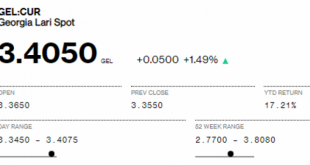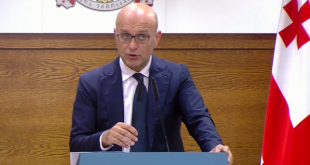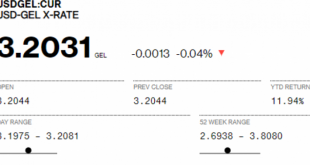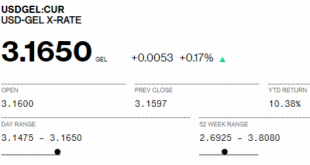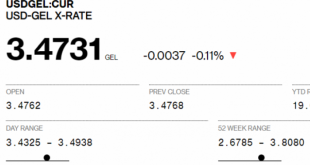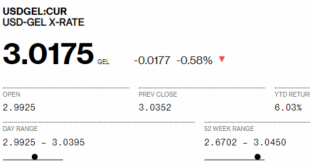TBILISI(BPI)- The Monetary Policy Committee (MPC) of the National Bank of Georgia (NBG) decided to cut the refinancing rate by 0.50 percentage points to 8.5 percent on April 29, 2020 .
Amid the Covid-19 pandemic and the sharp decline in international oil prices, the economic uncertainty in the world remains high. In Georgia, the annual inflation rate in March was 6.1 percent. According to the NBG’s forecast, due to temporary factors, inflation will remain high for several months, then gradually decline, and in the first half of 2021 approach the target level.
The inflation dynamics are determined by the interaction of the both demand and supply side factors. It should be noted that the reduction in aggregate demand is transmitted to the inflation with a lag, while supply-side factors affect inflation faster. Supply factors caused by logistical constraints will delay the decline in inflation over the coming months, however a sharp decline in external and domestic demand due to pandemic will create a downward preassure on inflation over the course of the year. Given the expected reduction in the demand, there is no need to further maintain such tightened policy stance. Hence, the Monetary Policy Committee started the gradual exit from the tightened policy and reduced the policy rate by 0.5 percentage points. Despite the rate cut, monetary policy remains tight, ensuring a return of inflation to the target level in the medium term. The Monetary Policy Committee will exit the tight monetary policy stance gradually and further steps will depend on how quickly inflation expectations recede.
As noted, the sharp decline in demand is expected to exert a downwards preassure on inflation. According to the current forecast, following the decline in domestic and external demand, Georgia’s real economic growth will be around -4 percent. According to preliminary data, in March, exports of goods fell by 22 percent and the revenues from international travelers declined by almost 70 percent. There was also a decrease in remittances (-9 percent). At the same time, imports declined by 13 percent, indicating a weakening in domestic demand.
From the supply side factors, the delays in production and supply chains affect companies’ costs and, consequently, prices. However, assuming that the strict restrictions imposed by the spread of the covid-19 are only temporary, the latter will only have a temporary effect, hence the monetary policy reaction to this type of shock will be counterproductive. At the same time, the sharp decline of oil prices on international markets are being reflected on the gradual decline in gasoline prices in Georgia, exerting a downwards preassure in inflation. In addition, the expected substantial donor support will help mitigate the impact of the shock on the economic activity and inflation.
Considering current level of uncertainty, both credit and liquidity risks have increased, that was reflected in the growth of market interest rates. To ensure that liquidity risk does not limit credit to the economy, the NBG introduced additional instruments to provide liquidity. The NBG provides liquidity through swaps operations for both commercial banks and microfinance organizations.
The NBG will continue to monitor the developments in the economy and financial markets and will use all means and instruments at its disposal in order to ensure the price stability.
The next meeting of the Monetary Policy Committee is scheduled on June 24, 2020.
commersant.ge
 Business Political Insights BPI.GE
Business Political Insights BPI.GE






